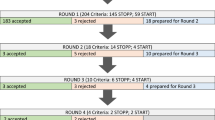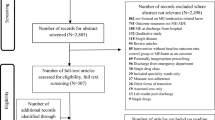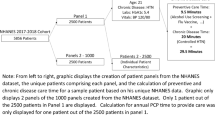Abstract
Background
Medication reconciliation (MedRec) in hospitals is an important tool to enhance the continuity of care, but completing MedRec is challenging.
Aim
The aim of this study was to investigate whether queueing theory could be used to compare various interventions to optimise the MedRec process to ultimately reduce the number of patients discharged prior to MedRec being completed. Queueing theory, the mathematical study of waiting lines or queues, has not been previously applied in hospital pharmacies but enables comparisons without interfering with the baseline workflow.
Method
Possible interventions to enhance the MedRec process (replacing in-person conversations with telephone conversations, reallocating pharmacy technicians (PTs) or adjusting their working schedule) were compared in a computer experiment. The primary outcome was the percentage of patients with an incomplete discharge MedRec. Due to the COVID-19 pandemic, it was possible to add a real-life post hoc intervention (PTs starting their shift later) to the theoretical interventions. Descriptive analysis was performed.
Results
The queueing model showed that the number of patients with an incomplete discharge MedRec decreased from 37.2% in the original scenario to approximately 16% when the PTs started their shift 2 h earlier and 1 PT was reassigned to prepare the discharge MedRec. The number increased with the real-life post hoc intervention (PTs starting later), which matches a decrease in the computer experiment when started earlier.
Conclusion
Using queueing theory in a computer experiment could identify the most promising theoretical intervention to decrease the percentage of patients discharged prior to MedRec being completed.

Similar content being viewed by others
References
Cochran JK, Roche KT. A multi-class queuing network analysis methodology for improving hospital emergency department performance. Comput Oper Res. 2009;36:1497–512. https://doi.org/10.1016/j.cor.2008.02.004.
Uitvlugt EB, Janssen MJA, Siegert CEH, et al. Medication-related hospital readmissions within 30 days of discharge: prevalence, preventability, type of medication errors and risk factors. Front Pharmacol. 2021;12: 567424. https://doi.org/10.3389/fphar.2021.567424.
Zorginstituut Nederland. Richtlijn overdracht van medicatiegegevens in de keten. November 28, 2019. https://www.zorginzicht.nl/kwaliteitsinstrumenten/medicatieoverdracht. (Medication transfer - Transfer of medication data in the chain) Accessed 12 Nov 2023.
Kwan JL, Lo L, Sampson M, et al. Medication reconciliation during transitions of care as a patient safety strategy: a systematic review. Ann Intern Med. 2013;158:397–403. https://doi.org/10.7326/0003-4819-158-5-201303051-00006.
Mekonnen AB, McLachlan AJ, Brien JA. Effectiveness of pharmacist-led medication reconciliation programmes on clinical outcomes at hospital transitions: a systematic review and meta-analysis. BMJ Open. 2016;6(2): e010003. https://doi.org/10.1136/bmjopen-2015-010003.
Quélennec B, Beretz L, Paya D, et al. Potential clinical impact of medication discrepancies at hospital admission. Eur J Intern Med. 2013;24(6):530–5. https://doi.org/10.1016/j.ejim.2013.02.007.
Studer H, Imfeld-Isenegger TL, Beeler PE, et al. The impact of pharmacist-led medication reconciliation and interprofessional ward rounds on drug-related problems at hospital discharge. Int J Clin Pharm. 2022;45(1):117–25. https://doi.org/10.1007/s11096-022-01496-3.
World Health Organization. Medication without harm. https://www.who.int/initiatives/medication-without-harm. Accessed 12 Nov 2023.
Abuelhana A, Ashfield L, Scott MG, et al. Analysis of activities undertaken by ward-based clinical pharmacy technicians during patient hospital journey. Eur J Hosp Pharm. 2021;28(6):313–9. https://doi.org/10.1136/ejhpharm-2019-001972.
Stolldorf DP, Ridner SH, Vogus TJ, et al. Implementation strategies in the context of medication reconciliation: a qualitative study. Implement Sci Commun. 2021;2(1):63. https://doi.org/10.1186/s43058-021-00162-5.
International Pharmaceutical Federation (FIP). Medicines reconciliation A toolkit for pharmacists. 2021. https://www.fip.org/file/4949 Accessed 12 Nov 2023.
Elbeddini A, Almasalkhi S, Prabaharan T. Avoiding a Med-Wreck: a structured medication reconciliation framework and standardized auditing tool utilized to optimize patient safety and reallocate hospital resources. J Pharm Policy Pract. 2021;14(1):10. https://doi.org/10.1186/s40545-021-00296-w.
Horák P, Makridaki D, Polidori P, et al. Hospital pharmacy workforce EAHP position paper. Eur J Hosp Pharm. 2023. https://doi.org/10.1136/ejhpharm-2023-003919.
Dias Fernandes B, Coutinho Ribeiro L, Dos Santos JCP, et al. Medication Reconciliation at hospital admission and discharge: evaluation of fidelity and process outcomes in a real-world setting. Int J Clin Pract. 2021;75(10):e14656. https://doi.org/10.1111/ijcp.14656.
Belda-Rustarazo S, Cantero-Hinojosa J, Salmeron-García A, et al. Medication reconciliation at admission and discharge: an analysis of prevalence and associated risk factors. Int J Clin Pract. 2015;69(11):1268–74. https://doi.org/10.1111/ijcp.12701.
Hill A, Wilcock M. Exploring pharmacist involvement in the discharge medicines reconciliation process and information transfer to primary care: an observational study. Int J Clin Pharm. 2022;44(1):27–33. https://doi.org/10.1007/s11096-021-01300-8.
Hermann M, Dreetz Holt M, Kjome RLS, et al. Medication reconciliation—is it possible to speed up without compromising quality? A before–after study in the emergency department. Eur J Hosp Pharm. 2023;30:310–5. https://doi.org/10.1136/ejhpharm-2021-003071.
Zonderland ME, Boucherie RJ. Queuing networks in health care systems. In: Hall R, editor. Handbook of healthcare system scheduling. International series in operations research and management science, vol. 168. Boston: Springer; 2012. https://doi.org/10.1007/978-1-4614-1734-7_9.
Zonderland ME, Boucherie RJ, Hans EW, et al. Handbook of Healthcare Logistics: Bridging the Gap between Theory and Practice. In Boston: Springer; 2021. International Series in Operations Research & Management Science. Print ISBN 978-1-4614-1733-0. https://doi.org/10.1007/978-3-030-60212-3.
Welch JD, Bailey NTJ. Appointment systems in hospital outpatient departments. Lancet. 1952;259(6718):1105–8. https://doi.org/10.1016/S0140-6736(52)90763-0.
Green LV, Savin S. Reducing delays for medical appointments: a queueing approach. Oper Res. 2008;56(6):1526–38. https://doi.org/10.1287/opre.1080.0575.
Zonderland ME, Boer F, Boucherie RJ, et al. Redesign of a university hospital preanesthesia evaluation clinic using a queuing theory approach. Anesth Analg. 2009;109:1612–21. https://doi.org/10.1213/ANE.0b013e3181b921e7.
Bahadori M, Mohammadnejhad SM, Ravangard R, et al. Using queuing theory and simulation model to optimize hospital pharmacy performance. Iran Red Crescent Med J. 2014;16(3): e16807. https://doi.org/10.5812/ircmj.16807.
Dutch Civil Code 16–03–2019, Artikel 458. Available at: https://wetten.overheid.nl/BWBR0005290/2019-03-16/#Boek7_Titeldeel7_Afdeling5. Accessed 12 Nov 2023.
Drug Information System of National Health Care Institue. Available at https://www.gipdatabank.nl/databank?infotype=g&label=00-totaal&tabel_g_00-totaal=R_06_medicatie&geg=gebr&spec=. Accessed 10 Oct 2023.
Enver C, Ertürk Şengel B, Sancar M, et al. Medication reconciliation service in hospitalized patients with infectious diseases during coronavirus disease-2019 pandemic: an observational study. Turk J Pharm Sci. 2023;20(4):210–7. https://doi.org/10.4274/tjps.galenos.2022.08455.
Pevnick JM, Shane R, Schnipper JL. The problem with medication reconciliation. BMJ Qual Saf. 2016;25:726–30. https://doi.org/10.1136/bmjqs-2015-004734.
Gurwitz JH, Kapoor A, Garber L, et al. Effect of a multifaceted clinical pharmacist intervention on medication safety after hospitalization in persons prescribed high-risk medications: a randomized clinical trial. JAMA Intern Med. 2021;181(5):610–8. https://doi.org/10.1001/jamainternmed.2020.9285.
Dijk LM van, Eikenhorst L van, Muns L, et al. Medicatieverificatie bij ontslag: nieuwe benadering vanuit een Safety-I en Safety-II perspectief: derde evaluatie van het VMS-thema. Utrecht: Nivel, 2021. ISBN 978-94-6122-675-4. https://www.nivel.nl/sites/default/files/bestanden/1004039_1.pdf. Accessed 12 Nov 2023.
Acknowledgements
The authors would like to thank the application managers of Hospital Group Twente for providing data of the MedRec process.
Funding
No specific funding was received.
Author information
Authors and Affiliations
Corresponding author
Ethics declarations
Conflicts of interest
The authors have no conflicts of interest to declare.
Additional information
Publisher's Note
Springer Nature remains neutral with regard to jurisdictional claims in published maps and institutional affiliations.
Supplementary Information
Below is the link to the electronic supplementary material.
Rights and permissions
Springer Nature or its licensor (e.g. a society or other partner) holds exclusive rights to this article under a publishing agreement with the author(s) or other rightsholder(s); author self-archiving of the accepted manuscript version of this article is solely governed by the terms of such publishing agreement and applicable law.
About this article
Cite this article
Kruik-Kollöffel, W.J., Moltman, G.A.W., Wu, M.D. et al. Optimisation of medication reconciliation using queueing theory: a computer experiment. Int J Clin Pharm (2024). https://doi.org/10.1007/s11096-024-01722-0
Received:
Accepted:
Published:
DOI: https://doi.org/10.1007/s11096-024-01722-0




